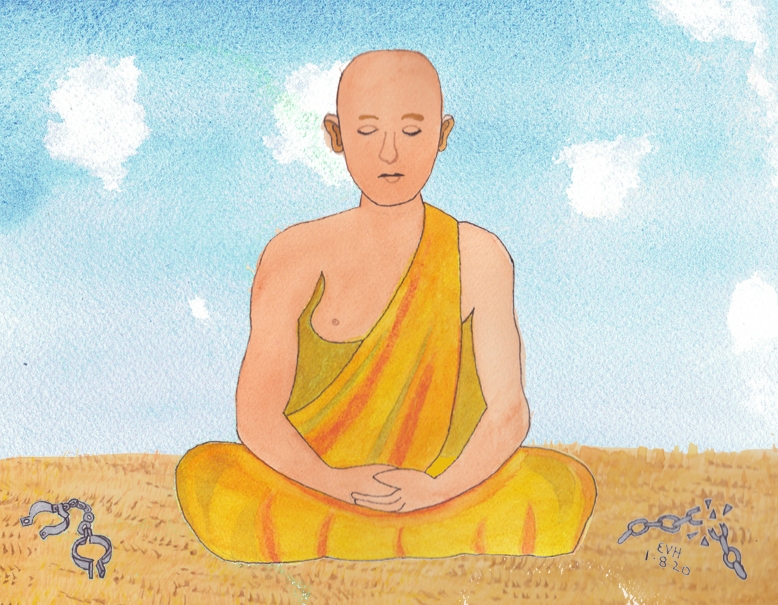
Jataka 201
Bandhanāgāra Jātaka
The Prison
as told by Eric Van Horn
originally translated by William Henry Denham Rouse, Cambridge University
originally edited by Professor Edward Byles Cowell, Cambridge University
This is a story whose basic message is lost beneath not-so-veiled misogyny. The basic metaphor is fine. It says that chains and ropes and manacles are nothing compared to the fetters of sense desires. But these stories have obviously been doctored to represent women in a negative way. The Buddha’s decision to ordain women was greatly resented by the monks, and that feeling continues to this day. Fortunately, that attitude is slowly changing.
“Not iron fetters.” The Master told this story while he was staying at Jetavana. It is about a prison.
At the time of this story we hear that a gang of burglars, highwaymen, and murderers had been caught and brought before the King of Kosala. The King ordered them to be bound with chains, ropes, and manacles.
Thirty country monks who wanted to see the Master paid him a visit and offered their salutations. On the next day, as they were seeking alms, they passed the prison and noticed these rascals. In the evening, after their return from the day’s alms rounds, they approached the Buddha. “Sir,” they said, “today as we were seeking alms, we saw a number of criminals bound fast in chains and manacles in the prison. They were in great misery. They could not break these fetters and run away. Is there any fetter stronger than these?”
The Master replied, “Monks, those are fetters, it is true. But the fetters that consist of a craving for wealth, food, sons, wives and children are stronger than they are a hundred-fold, nay a thousand-fold. Yet even those fetters, as hard as they are to break, have been broken by wise men of the past, those who went to Himalaya and became recluses.” Then he told them this story of the past.
Once upon a time, when Brahmadatta ruled over Benares, the Bodhisatta was born into a poor man’s family. When he grew up, his father died. He worked hard, earned wages, and supported his mother. His mother, much against his will, brought a wife home for him, and soon after his mother died. Then his wife became pregnant. Not knowing that she was pregnant, he said to her, “Wife, you must earn your own way. I will renounce the world and become a recluse.”
Then said she, “You cannot leave me now for I am with child. Wait until the child is born, and then you can go and become a recluse.” To this he agreed. So when the baby was born, he said, “Now, wife, you have safely delivered the baby, and I must become a recluse.’
“Wait,” she said, “until the child is weaned.” And after that she became pregnant again.
“If I agree to her request,” the Bodhisatta thought, “I will never get away. I will leave without saying a word to her and become a recluse.” So he told her nothing, but got up in the night and fled away.
When he tried to leave the city, the guards seized him. “I have a mother to support,” he said. “Let me go!” In this way he made them let him go free, and after staying in a certain place, he passed out by the chief gate and made his way to the Himalayas. There he lived as a recluse. He developed the supernormal powers (1. Replicate and project bodily-images of oneself, 2. Make oneself invisible, 3. Pass through solid objects, 4. Sink into solid ground, 5. Walk on water, 6. Fly, 7. Touch the sun and moon with one's hand, 8. Ascend to the world of the god Brahmā in the highest heavens) and the attainments (jhānas) as he lived in the rapture of meditation. As he lived there, he exulted, saying, “The bond of wife and child and the bond of passion that so hard to break are broken!” and he uttered these lines:
“Not iron fetters — so the wise have told —
Not ropes, or bars of wood, so fast can hold.
As passion, and the love of child or wife,
Of precious gems and earrings of fine gold.
“These heavy fetters — who is there can find
Release from such? These are the ties that bind.
These if the wise can burst, then they are free,
Leaving all lust and all desire behind!”

Figure: Breaking the Bonds of Sense Desire
And the Bodhisatta, after uttering this aspiration, without breaking the charm of his ecstasy was reborn in Brahma’s world.
When the Master had ended this discourse, he taught the Four Noble Truths, at the conclusion of which some entered the First Path (stream-entry), some the Second (once-returner), some the Third (non-returner), and some the Fourth (arahant). Then the Master identified the birth: “In the story, Mahāmāyā (the Buddha’s biological mother) was the mother, King Suddhōdana (the Buddha’s father) was the father, Rāhula’s mother (Yasodarā) was the wife, Rāhula (the Buddha’s son) himself the son, and I was the man who left his family and became a recluse.”
